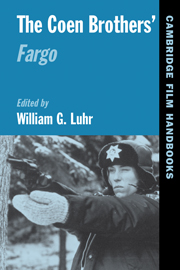Book contents
- Frontmatter
- Contents
- Acknowledgments
- Contributors
- 1 Introduction
- 2 Fargo in Context: The Middle of Nowhere?
- 3 Motherhood, Homicide, and Swedish Meatballs: The Quiet Triumph of the Maternal in Fargo
- 4 Fargo, or the Blank Frontier
- 5 ‘Kinda Funny Lookin’”: Steve Buscemi's Disorderly Body
- 6 Fargo: “Far Removed from the Stereotypes of …”
- 7 Closer to the Life Than the Conventions of Cinema: Interview with the Coen Brothers (conducted in Cannes on May 16, 1996)
- 8 Cold-Blooded Scheming: Roger Deakins and Fargo
- 9 Carter Burwell in Conversation: Music for the Films of Joel and Ethan Coen
- 10 Review of Fargo
- 11 Prairie Home Death Trip
- Filmography of Joel and Ethan Coen
- Selected Bibliography
- Index
11 - Prairie Home Death Trip
Published online by Cambridge University Press: 07 December 2009
- Frontmatter
- Contents
- Acknowledgments
- Contributors
- 1 Introduction
- 2 Fargo in Context: The Middle of Nowhere?
- 3 Motherhood, Homicide, and Swedish Meatballs: The Quiet Triumph of the Maternal in Fargo
- 4 Fargo, or the Blank Frontier
- 5 ‘Kinda Funny Lookin’”: Steve Buscemi's Disorderly Body
- 6 Fargo: “Far Removed from the Stereotypes of …”
- 7 Closer to the Life Than the Conventions of Cinema: Interview with the Coen Brothers (conducted in Cannes on May 16, 1996)
- 8 Cold-Blooded Scheming: Roger Deakins and Fargo
- 9 Carter Burwell in Conversation: Music for the Films of Joel and Ethan Coen
- 10 Review of Fargo
- 11 Prairie Home Death Trip
- Filmography of Joel and Ethan Coen
- Selected Bibliography
- Index
Summary
Our politicians perennially laud small town values as a wellspring of the republic's vigor. But American authors have also persistently dwelt upon the penchant for suicidal despair, lunacy, and criminality lurking beneath the placid façade of provincial life. Explosions of aggression in tranquil backwater locales have been variously attributed to social isolation, puritanical pressure for conformity, or frontier individualism gone daft. Notable past and contemporary descriptions of the dire results attendant upon blowing the lid off the provincial pressure cooker are found in Nathaniel Hawthorne's The Scarlet Letter, William Faulkner's Barn Burner, Edward Arlington Robinson's Spoon River Anthology, Shirley Jackson's “The Lottery,” and virtually every Stephen King novel. Hollywood mediations on the subject include East of Eden (1954), Peyton Place (1957), Psycho (1961), Blue Velvet (1986), and virtually every picture based on every Stephen King novel.
One's favorite non-fiction chronicle in this morbid vein is Wisconsin Death Trip, social historian Michael Lesy's doctoral thesis. Overviewing regional gazettes from the closing decades of the last century, Lesy found that homely descriptions of church picnics and visiting relatives regularly rubbed elbows with accounts of appalling murders, grisly suicides, and attacks of gibbering madness one would have thought more likely fodder for the urban yellow press of that and our own day.
For instance, it was not unusual for the spring thaw to reveal that members of a shack-wacky farm family had slaughtered each other during the endless harsh winter.
- Type
- Chapter
- Information
- The Coen Brothers' Fargo , pp. 142 - 150Publisher: Cambridge University PressPrint publication year: 2003

